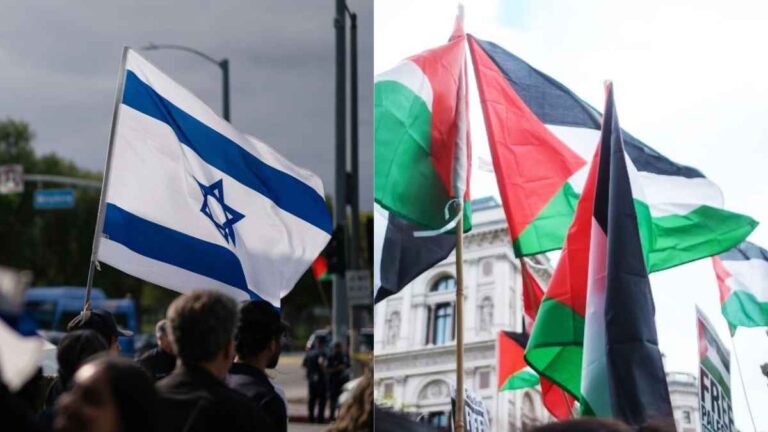In recent times, the conflict between Hamas and Israel has thrust the Gaza Strip and the partially recognized State of Palestine into the forefront of the global news cycle. But which are the countries worldwide that do not recognize Palestine as a state, and which ones do no recognize Israel?
Table of Contents
Recognition status: a global snapshot
Following the proclamation of the State of Palestine by the Palestine Liberation Organization (PLO) coalition on November 15, 1988, claiming sovereignty over the Gaza Strip, the West Bank, and East Jerusalem, the issue of recognition has become central.
As of November 2023, out of the 193 United Nations members, 138 (72%) formally recognize the State of Palestine.
The 55 countries that do not recognize Palestine
Despite widespread recognition, a notable portion of countries does not formally recognize Palestine as a state. Currently, there are 55 countries that fall into this category, each maintaining their stance on the matter:
- Andorra: No
- Armenia: No
- Australia: No, informal relations
- Austria: No, informal relations
- Bahamas: No
- Barbados: No
- Belgium: No, informal relations
- Cameroon: No, informal relations
- Canada: No, informal relations
- Croatia: No, informal relations
- Denmark: No, informal relations
- Eritrea: No, informal relations
- Estonia: No, informal relations
- Micronesia: No
- Fiji: No
- Finland; No, informal relations
- France: No, informal relations
- Germany: No, informal relations
- Greece: No, informal relations
- Ireland: No, informal relations
- Israel: No, informal relations
- Italy: No, informal relations
- Jamaica: No
- Japan: No, informal relations
- Kiribati: No
- Latvia: No, informal relations
- Liechtenstein: No
- Lithuania: No, informal relations
- Luxembourg: No, informal relations
- Marshall Islands: No
- Mexico: No, informal relations
- Moldova: No, informal relations
- Monaco: No
- Myanmar: No
- Nauru: No
- Netherlands: No, informal relations
- New Zealand: No, informal relations
- North Macedonia: No
- Norway: No, informal relations
- Palau: No
- Panama: No
- Portugal: No, informal relations
- Samoa: No
- San Marino: No
- Singapore: No
- Slovenia: No, informal relations
- Solomon Islands: No
- South Korea: No, informal relations
- Spain: No, informal relations
- Switzerland: No, informal relations
- Tonga: No
- Trinidad and Tobago: No
- Tuvalu: No
- United Kingdom: No, informal relations
- United States: No, informal relations
Many of the world’s Western countries, including the G7 countries, do not recognize Palestine. Instead, many maintain informal diplomatic relations.
In contrast, emerging major economies like those within BRICS and other G20 nations, including Argentina, Indonesia, Türkiye, and Saudi Arabia, officially recognize the state.
In 2012, the State of Palestine was also upgraded by the UN to become a non-member observer state, a status shared only by the Holy See of Vatican City.
The 29 countries that do not recognize Israel
As of November 2023, the majority of the United Nations’ member states, officially acknowledge Israel as a sovereign state.
Notably, all G7 countries are among those recognizing Israel’s statehood. Even the State of Palestine, as part of the Oslo Accords signed in 1993, recognizes Israel’s existence.
However, there remain 29 countries that do not formally recognize Israel:
- Afghanistan: never
- Algeria: never
- Bangladesh: never
- Bolivia: suspended/cut relations
- Brunei: never
- Comoros: never
- Cuba: withdrew
- Djibouti: never
- Indonesia: never
- Iran: withdrew
- Iraq: never
- Kuwait: never
- Lebanon: never
- Libya: never
- Malaysia: never
- Maldives: suspended/cut relations
- Mali: suspended/cut relations
- Mauritania: suspended/cut relations
- Niger: suspended/cut relations
- North Korea: never
- Oman: never
- Pakistan: never
- Qatar: never
- Saudi Arabia: never
- Somalia: never
- Syria: never
- Tunisia: never
- Venezuela: suspended/cut relations
- Yemen: never
Among these, with the exception of Bolivia, Cuba, North Korea, and Venezuela, the majority are predominantly Muslim nations. Notably, countries like Iraq, Lebanon, and Syria have never acknowledged Israel’s sovereignty and technically remain in a state of war with it. Iran, despite having had relations with Israel in the past, severed all ties after the 1979 Iranian Revolution.
Cuba initially recognized Israel in 1949 but reversed its stance in 1973, actively supporting Egypt and Syria during the Yom Kippur War against Israel. On the other hand, some Muslim-majority nations, including Egypt, Jordan, and the UAE, have taken steps toward normalization with Israel over time.
Military conflicts involving Israel, particularly in the Gaza Strip, often strain its relations with other countries. During the Israel-Gaza conflicts, diplomatic ties have been severed by certain nations. Venezuela, for instance, completely cut off diplomatic relations with Israel during the 2008–2009 conflict, while Bolivia followed suit over the ongoing Israel-Hamas War.
As of November 2023, 85% of UN member states officially recognize Israel, in comparison to 72% for the State of Palestine.
Read also: Conflict in the Gaza Strip, who supports Israel and who Hamas? The major funders of the war












